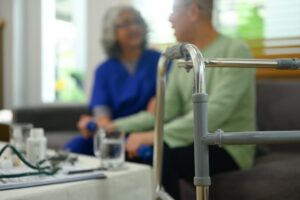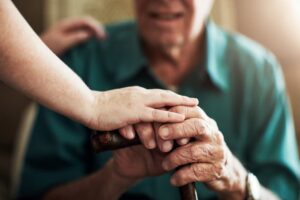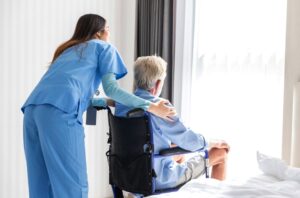How to Advocate for Better Staffing Ratios in Nursing Homes
Nursing Home AbuseUnder-staffing in nursing homes often leads to neglect, compromised safety, and the dignity of the loved ones. Residents in understaffed nursing homes may suffer bedsores, dehydration, malnutrition, infections, medication errors, and emotional trauma.
When injuries occur due to inadequate staffing, affected families have a right to compensation. Pursuing justice is a daunting task, due to resistant nursing homes and the emotional strain while grieving or caring for an injured loved one.
Similarly, proving negligence requires detailed evidence of staffing failures and their direct impact on care. A skilled nursing home abuse attorney can help by investigating violations, gathering records, and building a strong case against the negligent party.
Key Takeaways
- Understaffing in nursing homes leads to neglect, serious injuries, and emotional trauma.
- Families can advocate for better staffing by knowing state standards and documenting care concerns.
- Legal claims for negligence may result in compensation for injuries, pain, and reduced quality of life.
- Proving negligence requires strong evidence such as medical records, staffing logs, and expert testimony.
- Nursing home abuse cases often settle, but may go to trial for higher compensation or justice.
- A nursing home abuse attorney can help investigate, gather evidence, and fight for fair and just compensation for your losses.
- Call a nursing home abuse lawyer for legal support and guidance.
How Many Staff to Residents in a Care Home
 Care home staffing ratios vary significantly depending on the facility type and location. The new federal staffing ratios for nursing homes require facilities to provide a minimum of 3.48 hours per resident day (HPRD) of total direct nursing care, with at least 0.55 HPRD from registered nurses and 2.45 HPRD from nurse aides.
Care home staffing ratios vary significantly depending on the facility type and location. The new federal staffing ratios for nursing homes require facilities to provide a minimum of 3.48 hours per resident day (HPRD) of total direct nursing care, with at least 0.55 HPRD from registered nurses and 2.45 HPRD from nurse aides.
For assisted living facilities, the typical staff-to-resident ratio is around 1:8, meaning one caregiver oversees eight residents during their shift. However, depending on state regulations, ratios can range from 1:6 to 1:20.
How to Advocate for Better Staffing Ratios in Nursing Homes
- Research Current Standards: Familiarize yourself with your state’s minimum staffing requirements and compare them to your facility’s actual ratios. Use Medicare’s Care Compare website to review staffing data for specific nursing homes.
- Document Concerns: Keep detailed records of incidents that may indicate understaffing, including delayed response times, missed medications, inadequate personal care, or safety issues affecting residents.
- Contact Facility Administration: Meet nursing home administrators to discuss staffing concerns. Present specific examples and request information about their staffing plans and budget allocations.
- Engage with Family Councils: Join or form family councils within the facility to collectively address staffing issues. These groups have more influence when advocating for improvements than individual complaints.
- File Formal Complaints: Report serious staffing deficiencies to your state’s health department, the Centers for Medicare & Medicaid Services, or your local ombudsman program for investigation.
- Contact Elected Representatives: Write to state legislators and congressional representatives about the need for stronger staffing requirements and enforcement mechanisms in nursing homes.
- Support Legislative Initiatives: Advocate for bills that establish minimum staffing ratios, increase funding for nursing home staff wages, and improve working conditions to reduce turnover rates.
- Utilize Media and Social Advocacy: Share your experiences through local media, social media campaigns, or patient advocacy organizations to raise public awareness about staffing issues.
How Much Can You Sue a Nursing Home for Negligence
 When families entrust their loved ones to nursing home care, they expect professional, compassionate treatment prioritizing residents’ health and safety. Unfortunately, chronic understaffing in nursing facilities has become widespread negligence that can lead to devastating consequences for vulnerable residents.
When families entrust their loved ones to nursing home care, they expect professional, compassionate treatment prioritizing residents’ health and safety. Unfortunately, chronic understaffing in nursing facilities has become widespread negligence that can lead to devastating consequences for vulnerable residents.
Understaffing is a form of negligence that leads to delayed medical care, inadequate supervision, missed medications, poor hygiene assistance, and increased fall risks.
If your loved one has suffered harm due to nursing home negligence, you may be entitled to significant compensation. However, the amount you can recover varies considerably based on several factors, including:
Severity and Type of Injuries
The extent and nature of injuries sustained by your loved one directly impact the potential settlement or jury award. Minor injuries, such as bruises or temporary discomfort, may result in lower compensation.
On the other hand, severe harm like infected bedsores, broken bones from falls, malnutrition, dehydration, or medication errors leading to hospitalization can substantially increase case value.
Catastrophic injuries that cause permanent disability, cognitive decline, or require ongoing medical intervention typically warrant the highest compensation amounts.
A nursing home injury lawyer can use medical records to prove the severity of an injury and negotiate for a settlement value that matches your losses.
Medical Expenses and Future Care Costs
 Current and projected medical expenses form a significant component of nursing home negligence claims. These damages cover emergency room visits, hospital stays, additional treatments, medications, rehabilitation services, and specialized equipment needed due to the facility’s negligence.
Current and projected medical expenses form a significant component of nursing home negligence claims. These damages cover emergency room visits, hospital stays, additional treatments, medications, rehabilitation services, and specialized equipment needed due to the facility’s negligence.
Future medical costs are significant for ongoing conditions that require continued treatment or monitoring.
Expert medical testimony often helps establish the full scope of necessary care and associated costs, ensuring families receive adequate compensation for immediate and long-term medical needs.
Pain and Suffering Damages
Non-economic damages for physical pain, emotional distress, and mental anguish can represent a substantial portion of your compensation. Nursing home residents who experience neglect often suffer significant psychological trauma, depression, anxiety, and loss of dignity.
The duration and intensity of suffering and the resident’s awareness of their situation influence these damage calculations. Courts recognize that elderly residents in nursing homes are particularly vulnerable, and awards for pain and suffering allow them to pay for treatment.
Lost Quality of Life and Companionship
Negligence can rob residents of their remaining years of comfort, independence, and meaningful relationships with family members. Loss of enjoyment of life damages compensate for the resident’s inability to participate in previously enjoyed activities, social interactions, or personal pursuits due to their injuries.
Family members may also recover damages for loss of companionship if the nursing home’s negligence impacted their relationship with the resident.
Strength of Evidence and Documentation
The quality and quantity of evidence supporting your claim can affect the potential compensation. The more evidence you have, the better your chances of receiving a higher settlement value.
Strong cases typically include detailed medical records, incident reports, witness statements, expert testimony, photographs of injuries or unsafe conditions, and documentation of the facility’s staffing shortages or policy violations.
Video surveillance, if available, can provide compelling evidence of neglect or abuse. Comprehensive documentation demonstrates the facility’s breach of duty and helps establish the full extent of damages suffered.
Facility’s Financial Resources and Insurance Coverage
The nursing home’s insurance coverage limits and financial assets influence the maximum recovery possible. Large corporate chains typically carry substantial insurance policies and have deeper pockets for settlements, while smaller independent facilities may have limited coverage.
A nursing home abuse attorney can investigate the facility’s insurance policies, parent company assets, and financial standing to determine the best strategy for maximizing your recovery.
Punitive Damages
In cases involving egregious negligence, willful misconduct, or patterns of abuse, courts may award punitive damages designed to punish the facility and deter similar behavior. These damages can significantly increase your total compensation beyond actual losses suffered.
You should consult a nursing home abuse lawyer if you believe your loved one has suffered due to nursing home negligence. They can gather compelling evidence to prove negligence and increase your chances of receiving punitive damages.
How to Prove Nursing Home Negligence
 Proving nursing home negligence requires demonstrating that the facility failed to meet accepted standards of care, directly causing harm to your loved one. Success depends on establishing four key legal elements: duty, breach, causation, and damages through compelling evidence.
Proving nursing home negligence requires demonstrating that the facility failed to meet accepted standards of care, directly causing harm to your loved one. Success depends on establishing four key legal elements: duty, breach, causation, and damages through compelling evidence.
Proving nursing home negligence requires a thorough investigation and presentation of various types of evidence to support your case. Here are eight types of evidence that a nursing home abuse lawyer can use to demonstrate nursing home negligence:
- Witness Statements: Eyewitness accounts from residents, staff, or visitors can provide valuable insights into the standard of care within the nursing home facility. These statements can help corroborate your claims of inadequate staffing levels or negligent practices.
- Medical Records: Reviewing medical records can reveal neglect or substandard care patterns. Documentation of untreated injuries, medication errors, or signs of malnutrition can serve as concrete evidence of negligence.
- Incident Reports: Formal reports filed by the nursing home staff documenting accidents, injuries, or incidents of neglect can be used as evidence to support your case. These reports may highlight systemic issues within the facility.
- Expert Testimony: Expert witnesses, such as medical professionals or nursing home consultants, can provide an expert opinion on whether the care provided met the standard expected in the industry. Their testimony can strengthen your argument for nursing home negligence.
- Surveillance Footage: Video footage from security cameras within the facility can capture instances of neglect or abuse. Visual evidence can be powerful in illustrating the conditions within the nursing home and supporting your claims.
- Staffing Records: Reviewing staffing schedules and records can reveal instances of understaffing or inadequate training. Discrepancies between the recommended staff-to-resident ratios and the actual staffing levels can be used as evidence of negligence.
- State Inspection Reports: Official reports from state health departments or regulatory agencies can highlight compliance issues or citations issued to the nursing home facility. These reports can be compelling evidence of ongoing problems within the facility.
- Financial Records: In some cases, financial records showing budget cuts or cost-saving measures that compromise resident care can be used as evidence of negligence. Evidence of prioritizing profits over resident well-being can strengthen your case for nursing home negligence.
A nursing home abuse attorney can build a compelling case by analyzing patterns, timelines, and documented harm to reveal neglect linked to understaffing. They also know how to present the evidence and pursue fair compensation for affected families and residents.
How Long Does a Nursing Home Lawsuit Take
 A nursing home lawsuit typically takes 1-3 years from filing to resolution, though timelines vary. Initial investigations and evidence gathering may take 3-6 months, followed by filing the complaint.
A nursing home lawsuit typically takes 1-3 years from filing to resolution, though timelines vary. Initial investigations and evidence gathering may take 3-6 months, followed by filing the complaint.
Discovery, where both sides exchange evidence, can last 6-12 months. Settlement negotiations might resolve the case within a year, but if a trial is needed, it can extend to 2-3 years.
How a Lawyer Can Strengthen Your Fight for Justice
You have a right to pursue compensation if a loved one has suffered harm in a nursing home due to understaffing. Facilities may deny liability, claiming adequate care despite apparent neglect, or obscure records to hide staffing shortages.
A nursing home abuse lawyer overcomes these hurdles by conducting thorough investigations, securing supporting evidence like staffing logs, and leveraging expert testimony to prove neglect.
With deep knowledge of elder law, they build a compelling case to ensure accountability and fair compensation. Contact a nursing home abuse attorney for legal support and guidance.
Frequently Asked Questions
What Qualifies as Nursing Home Abuse or Neglect?
Nursing home abuse includes physical, emotional, sexual, or financial harm, while neglect involves failure to provide adequate care, such as food, medical attention, or hygiene, often due to understaffing.
Can I Afford a Nursing Home Abuse Attorney?
Many nursing home abuse lawyers work on a contingency fee basis, meaning you only pay if they successfully recover your compensation. The arrangement makes justice accessible to everyone, regardless of financial circumstances.
Will My Case Go to Trial?
Most nursing home abuse claims are resolved through settlements without going to trial. However, the case may proceed to trial if the facility denies liability or offers a low settlement that doesn’t cover your losses.
Going to trial allows for a neutral assessment of the case, potentially leading to a higher settlement. A nursing home abuse lawyer can present evidence, cross-examine witnesses, and push for maximum compensation in court.
What Should I Do if I Suspect Nursing Home Abuse?
If you suspect nursing home abuse, act quickly to protect your loved one. Document any signs of neglect or mistreatment. You should also speak with the facility’s management and report to the relevant state agency.
Seek medical attention and speak to a nursing home abuse attorney to understand your rights and options. Prompt action can prevent further harm and protect your legal rights.
Nathan Hughey, an attorney and fourth-generation South Carolinian, founded Hughey Law Firm in 2007. Before that, he spent five years defending nursing homes and insurance companies. Leveraging his experience, he now advocates for those injured or wronged by such entities, securing over $290 million in verdicts and settlements.
